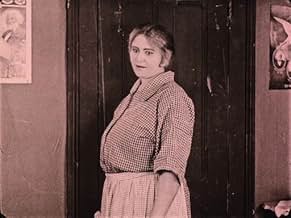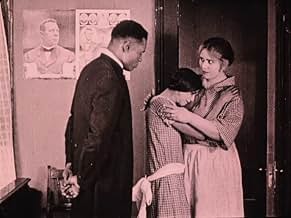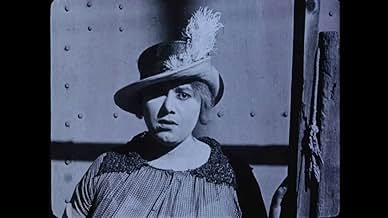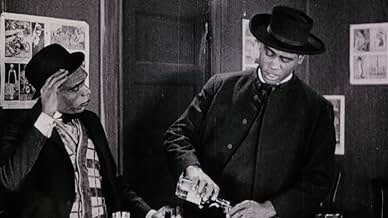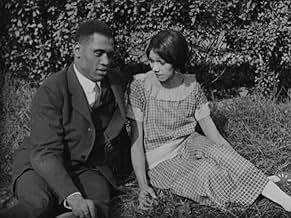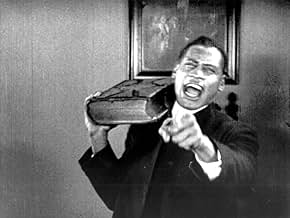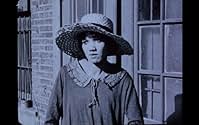IMDb RATING
6.2/10
1.3K
YOUR RATING
A malevolent phony preacher plots to take advantage of a woman from his congregation who happens to be in love with his long-estranged identical twin brother.A malevolent phony preacher plots to take advantage of a woman from his congregation who happens to be in love with his long-estranged identical twin brother.A malevolent phony preacher plots to take advantage of a woman from his congregation who happens to be in love with his long-estranged identical twin brother.
- Awards
- 1 win total
Marshall Rogers
- Speakeasy Proprietor
- (as Marshall Rodgers)
Mercedes Gilbert
- Martha Jane - Her Mother
- (uncredited)
Julia Theresa Russell
- Isabelle - the Girl
- (uncredited)
Featured reviews
Its nice to see there was a Black director (Micheaux) with the gumption to take on difficult themes (like a crooked preacher and sexual abuse). Unfortunately his mastery of technique wasn't very good; this movie resembles the sort of thing D.W. Griffith was doing in 1913, both in form and tone (cf. A Girl and her Trust). Cinema had evolved by 1925.
There is one great comic sequence that is worth the price of the movie, an over-the-top sermon (on the valley of dry bones) in which the whiskey-guzzling preacher has his congregation in such ecstasy that they do what looks suspiciously like break-dancing. Robeson, usually the good guy, here proves that he is equally adept at playing a sleazebag when required. There is a similar "sermon" in The Blues Brothers that was surely inspired by this one. The comical stereotypes would normally cause us to cry "racism", but this movie was made by and for blacks.
Body and Soul explores serious issues and has moments of great fun, but is mainly of historical interest.
There is one great comic sequence that is worth the price of the movie, an over-the-top sermon (on the valley of dry bones) in which the whiskey-guzzling preacher has his congregation in such ecstasy that they do what looks suspiciously like break-dancing. Robeson, usually the good guy, here proves that he is equally adept at playing a sleazebag when required. There is a similar "sermon" in The Blues Brothers that was surely inspired by this one. The comical stereotypes would normally cause us to cry "racism", but this movie was made by and for blacks.
Body and Soul explores serious issues and has moments of great fun, but is mainly of historical interest.
A melodrama involving a con man who (somehow) has assumed the role of a preacher (Paul Robeson), and along with an ex-cellmate, sets out to bilk the townspeople out of their money. He's also got his eye on a young woman (Julia Theresa Russell) who just so happens to prefer his kinder twin brother. Robeson turns in a reasonably strong performance in the dual role, even if the character of his twin is somewhat ridiculous. Russell is reasonably good too, and the rape scene told in flashback evokes horror and is well done, probably the film's best.
Overall the film suffers from a weak script, complete with an enormous "it was just a dream" cliché. Accounts vary as to whether the unsatisfying conclusion was due to the considerable problems Micheaux had getting it approved, which unfortunately resulted in a significant hack job. As it is though, it suffers from sloppy editing, has dangling plot points (like the ex-cellmate), and drags on for longer than it should have.
Looking at the film through the lens of today can also be troubling, because the dialogue the characters use is what we think of as stereotypical. As with other films from Micheaux, he unapologetically criticizes the African-American community. Later he would say this:
"I have always tried to make my photoplays present the truth, to lay before the Race a cross-section of its own life, to view the colored heart from close range. My results might have been narrow at times, due perhaps to certain limited situations which I endeavored to portray, but in those limited situations the Truth was the predominant characteristic. It is only by presenting those portions of the Race portrayed in my pictures in the light and background of their true state that we can raise our people to greater heights. I am too much imbued with the spirit of Booker T. Washington to ingraft false virtues upon ourselves, to make ourselves that which we are not. Nothing could be a greater blow to our own progress. The recognition of our true situation will react in itself as a stimulus for self-advancement."
Thus, we have this dialogue, and we have the church congregation falling for the lengthy sermons of a low-life who drinks alcohol out of what looks like a water glass while preaching. Micheaux and other black leaders like W.E.B. DuBois saw religion critically, and as something holding back African-American progress. That's something we also see in the film 'Within Our Gates.' The portrait of ignorance is not flattering, and some black filmgoers were not amused. One at the time likened it to D.W. Griffith's 'Birth of a Nation,' saying "One would expect a white screenwriter to fan the flames of hatred. But what can we say when a black man portrays our people in the same manner?" The white censors were also displeased, seeing in the evil traits of a minister, even a false one, as "sacrilegious, immoral, and would tend to incite to crime."
There is thus a brave honesty here, at least until that ending sequence, and for that I admire Micheaux. He also shows the vulnerability of women in the rape (although it's not the case that she's not believed - in fact it's the opposite, her mother and the congregation believe her and attack the culprit). While rough around the edges, there's a certain power in being a film from a legendary African-American director and featuring the debut of a star, Robeson, who was incredibly multi-faceted and should be better known. Both have done better work, but I'm glad I saw this one, and it's worth checking out.
Overall the film suffers from a weak script, complete with an enormous "it was just a dream" cliché. Accounts vary as to whether the unsatisfying conclusion was due to the considerable problems Micheaux had getting it approved, which unfortunately resulted in a significant hack job. As it is though, it suffers from sloppy editing, has dangling plot points (like the ex-cellmate), and drags on for longer than it should have.
Looking at the film through the lens of today can also be troubling, because the dialogue the characters use is what we think of as stereotypical. As with other films from Micheaux, he unapologetically criticizes the African-American community. Later he would say this:
"I have always tried to make my photoplays present the truth, to lay before the Race a cross-section of its own life, to view the colored heart from close range. My results might have been narrow at times, due perhaps to certain limited situations which I endeavored to portray, but in those limited situations the Truth was the predominant characteristic. It is only by presenting those portions of the Race portrayed in my pictures in the light and background of their true state that we can raise our people to greater heights. I am too much imbued with the spirit of Booker T. Washington to ingraft false virtues upon ourselves, to make ourselves that which we are not. Nothing could be a greater blow to our own progress. The recognition of our true situation will react in itself as a stimulus for self-advancement."
Thus, we have this dialogue, and we have the church congregation falling for the lengthy sermons of a low-life who drinks alcohol out of what looks like a water glass while preaching. Micheaux and other black leaders like W.E.B. DuBois saw religion critically, and as something holding back African-American progress. That's something we also see in the film 'Within Our Gates.' The portrait of ignorance is not flattering, and some black filmgoers were not amused. One at the time likened it to D.W. Griffith's 'Birth of a Nation,' saying "One would expect a white screenwriter to fan the flames of hatred. But what can we say when a black man portrays our people in the same manner?" The white censors were also displeased, seeing in the evil traits of a minister, even a false one, as "sacrilegious, immoral, and would tend to incite to crime."
There is thus a brave honesty here, at least until that ending sequence, and for that I admire Micheaux. He also shows the vulnerability of women in the rape (although it's not the case that she's not believed - in fact it's the opposite, her mother and the congregation believe her and attack the culprit). While rough around the edges, there's a certain power in being a film from a legendary African-American director and featuring the debut of a star, Robeson, who was incredibly multi-faceted and should be better known. Both have done better work, but I'm glad I saw this one, and it's worth checking out.
I learned of Oscar Micheaux from Melvin Van Peebles's documentary "Classified X", about the history of cinema produced and directed by African-Americans. I recently saw Micheaux's "Veiled Aristocrats", and have now seen his "Body and Soul".
For the most part, it's a good movie, with Paul Robeson playing a con artist posing as a clergyman. However, there's one thing that's grating about it, and this might just be a 21st-century view of it: the dialogue on the intertitles. It sounds like stereotyped depictions of African-Americans. Maybe Micheaux was writing the actors' actual dialects, but to me it sounded like it came from a minstrel show. On that subject, after Willie Mays died recently, Keith Olbermann recalled a phone that he'd had with Mays, where Mays affected what sounded like a minstrel show voice (Olbermann didn't imitate it, noting that for a white person to do so would sound incredibly racist).
Anyway, it's an okay movie on its own, with fine performances all around. Just remember that the dialogue on the intertitles sounds cringey nowadays.
For the most part, it's a good movie, with Paul Robeson playing a con artist posing as a clergyman. However, there's one thing that's grating about it, and this might just be a 21st-century view of it: the dialogue on the intertitles. It sounds like stereotyped depictions of African-Americans. Maybe Micheaux was writing the actors' actual dialects, but to me it sounded like it came from a minstrel show. On that subject, after Willie Mays died recently, Keith Olbermann recalled a phone that he'd had with Mays, where Mays affected what sounded like a minstrel show voice (Olbermann didn't imitate it, noting that for a white person to do so would sound incredibly racist).
Anyway, it's an okay movie on its own, with fine performances all around. Just remember that the dialogue on the intertitles sounds cringey nowadays.
Two escaped fugitives bring ruin to an African-American community. One passes himself off as Rev. Isaiah T. Jenkins (Paul Robeson) and the other is his cellmate Yello-Curley' Hinds. The fake reverend corrupts a member of his congregation, Isabelle Perkins, who happens to love Sylvester, Jenkins' long-lost identical twin brother.
First, I don't like some of the text which tries to use colloquial black speech. It's downgrading but also makes it harder to understand. Maybe the black audience of the day feels more comfortable with that. This is to be black cinema made for a black audience. I'm willing to accept it for what it is. On the other hand, I don't think some of the plot points make sense.
The mother wouldn't buy Sylvester revealing himself as a reverend right after telling her daughter to find herself a reverend. The mother would assume that the young couple is faking it. I also don't think the twin brother idea works in this plot. Apparently, this movie was chopped up to satisfy the censors and maybe the longer version functions better. The main aspect that really works is the great Paul Robeson. He is the magnetic lead and he delivers compelling performances.
First, I don't like some of the text which tries to use colloquial black speech. It's downgrading but also makes it harder to understand. Maybe the black audience of the day feels more comfortable with that. This is to be black cinema made for a black audience. I'm willing to accept it for what it is. On the other hand, I don't think some of the plot points make sense.
The mother wouldn't buy Sylvester revealing himself as a reverend right after telling her daughter to find herself a reverend. The mother would assume that the young couple is faking it. I also don't think the twin brother idea works in this plot. Apparently, this movie was chopped up to satisfy the censors and maybe the longer version functions better. The main aspect that really works is the great Paul Robeson. He is the magnetic lead and he delivers compelling performances.
BODY AND SOUL (1925) is the third of Oscar Micheaux's surviving silents, with a cast exclusively comprised of African-American actors. It tells the story of Isaiah Jenkins (Paul Robeson), a phony reverend who preaches to a congregation in a small town in the American South, who is really an escaped convict. The locals look up to him, including Martha Jane (Mercedes Gilbert). Martha tries to push her daughter, Isabelle (Julia Theresa Russell) into marrying the reverend, even though she is already seeing his twin brother Sylvester (also played by Robeson). Isabelle, though, sees that he is not as pious as he appears to be. An incident takes place between Isaiah and Isabelle that drives Isabelle away from home, and Martha Jane is forced to confront an unpleasant truth she never would have imagined...
I felt that this was the best of Micheaux's surviving silent movies. The narrative is straightforward and easy to follow, without being burdened by excess characters or lengthy explanations. As was common with many silents, there are some melodramatic contrivances at times but nothing really insulting. Micheaux's narrative here is well focused and a flashback scene makes the movie more powerful. Paul Robeson is the main standout here, with a very charismatic performance as the fake preacher, alternately charming, intimidating, and aggressive – his acting is very expressive. Mercedes Gilbert, a famed black stage actress of the time, also does some nice work as the mother who has to accept that appearances can be deceiving. Some of her gestures and expressions are very much of her time, but she still projects a magnetism and emotional sincerity that makes her work convincing. Julia Theresa Russell is a bit more low-key, quite naturalistic in her portrayal.
Micheaux has some very effective camera-work here, particularly in the flashback scene which conveys disturbing events well with just a minimum of imagery and skillful editing. Not all of the editing here is superb, though – there are a few awkwardly staged moments, like a poorly choreographed fight scene and occasional repetition of action. However, despite that, the movie has an abundance of outstanding scenes.
BODY AND SOUL is, in conclusion, an advance over Micheaux's previous silents WITHIN OUR GATES and THE SYMBOL OF THE UNCONQUERED. It succeeds because of a focused, straightforward story, charismatic performances, and skillful production. SCORE: 8/10
I felt that this was the best of Micheaux's surviving silent movies. The narrative is straightforward and easy to follow, without being burdened by excess characters or lengthy explanations. As was common with many silents, there are some melodramatic contrivances at times but nothing really insulting. Micheaux's narrative here is well focused and a flashback scene makes the movie more powerful. Paul Robeson is the main standout here, with a very charismatic performance as the fake preacher, alternately charming, intimidating, and aggressive – his acting is very expressive. Mercedes Gilbert, a famed black stage actress of the time, also does some nice work as the mother who has to accept that appearances can be deceiving. Some of her gestures and expressions are very much of her time, but she still projects a magnetism and emotional sincerity that makes her work convincing. Julia Theresa Russell is a bit more low-key, quite naturalistic in her portrayal.
Micheaux has some very effective camera-work here, particularly in the flashback scene which conveys disturbing events well with just a minimum of imagery and skillful editing. Not all of the editing here is superb, though – there are a few awkwardly staged moments, like a poorly choreographed fight scene and occasional repetition of action. However, despite that, the movie has an abundance of outstanding scenes.
BODY AND SOUL is, in conclusion, an advance over Micheaux's previous silents WITHIN OUR GATES and THE SYMBOL OF THE UNCONQUERED. It succeeds because of a focused, straightforward story, charismatic performances, and skillful production. SCORE: 8/10
Did you know
- TriviaFilm debut of Paul Robeson.
- GoofsMother Martha Jane looks through her Bible for the saved money to show it to the sisters, but it's missing. She leaves the book on the table and while searching through some drawers, three shots of the sisters show no book on the table. When the mother returns to the table, the book is back.
- Quotes
Yello-Curley' Hinds - the Phony Reverend's Former Jailmate: I tell you that I was not seekin' you out, but dropped off here to find girls for 'Cotton Blossom's Shoulder Shakers' - - and this little Isabelle - - she appeals to muh!
- Alternate versionsRaymond Rohauer, Inc. copyrighted a restored version in 1979 with a music track and new credits. The music was composed and performed by Lee Erwin and was recorded at Carnegie Hall Cinema, New York. It's running time is 83 minutes.
- ConnectionsFeatured in Black Shadows on a Silver Screen (1975)
- How long is Body and Soul?Powered by Alexa
Details
- Runtime
- 1h 42m(102 min)
- Sound mix
- Aspect ratio
- 1.33 : 1
Contribute to this page
Suggest an edit or add missing content

